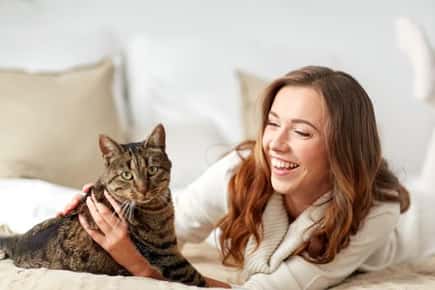
It is normal for cats to groom themselves throughout the day. In fact, cats may spend up to one half of each day grooming themselves. For this reason, you may not even notice if your cat starts to groom himself or herself excessively. Nonetheless, if your cat constantly licks himself or herself or is pulling out his or her fur, the behavior must be addressed and you should consult with your feline veterinarian.
What Constitutes Excessive Grooming?
Excessive grooming includes constant licking as well as pulling out tufts of hair. It can be caused by a medical problem or may be a compulsive disorder known as psychogenic alopecia.
Why Does My Cat Groom Excessively?
Cats groom excessively for a variety of reasons. For instance, intra-dermal skin tests and dermatological observation by a feline veterinarian may reveal skin parasites, fleas, food sensitivities, cystitis or other conditions that can be easily treated. Treatment may include prescribed or over-the-counter medications, natural remedies or an alteration in your cat's environment. Sometimes a change in diet may be all that is required.
Another reason your cat may groom excessively is that he or she has internal parasites, an endocrine imbalance or other serious medical issues. Your veterinarian may perform a blood test to determine whether your cat is suffering from an internal parasite or other medical condition.
In addition, your veterinarian might ask you questions regarding your cat's other behaviors, especially those that have recently changed. Certain changes in your cat’s behaviors, such as repetitive licking in one area, known as fur mowing, can be indicative of pain in the area and can be caused by anal sac impaction or injury. Knowing whether your cat is engaging in activities such howling at night, regurgitating, hiding, twitching, sneezing, coughing or wheezing or destroying things will help your veterinarian diagnose the cause of any excessive grooming habits.
Other Potential Causes of Excessive Grooming
Over-grooming due to medical reasons should be ruled out before concluding that your cat is exhibiting a compulsive disorder. If there is no evidence of a medical issue, excessive grooming may be psychogenic in nature.
Psychogenic alopecia can be caused by certain conditions, such as age-related cognitive difficulty, anxiety or boredom. Cats with age-related cognitive difficulty may start to groom excessively as a reaction to neurological changes that can occur with age.
Perhaps your cat is seeking attention due to a change in or addition to his or her environment. For example, introducing a new baby or pet into your home may be too much of a disruption to your cat’s routine, causing him or her to over-groom.
Another possibility is that your cat is experiencing anxiety because you're working more hours away from home or because you're exhibiting stressful behavior yourself.
Your cat may also simply be bored. Keeping him or her better entertained can solve many behavioral issues, including excessive grooming.
Your feline veterinarian can help determine the underlying reason for your cat's over-grooming and ascertain the best course of treatment to solve the problem.
